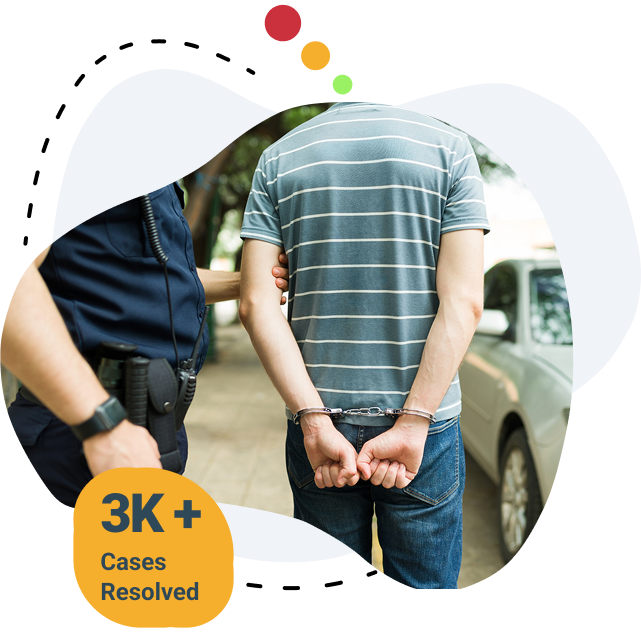
Fleeing and Eluding Lawyer in Florida: Defend Your Rights Today
Fight Your Ticket Now
No Points Guarantee
No School
No Court
Starting at $69
Understanding Fleeing and Eluding in Florida
Fleeing and eluding a law enforcement officer in Florida is a serious crime. You may be charged with eluding a law enforcement officer if you willfully refused to stop after being lawfully ordered by the police. Florida Statute 316.1935 establishes this crime as a felony.
Penalties for attempting to elude a law enforcement agency escalate with aggravating factors, such as high-speed driving, wanton disregard for public safety, reckless driving, or causing serious bodily injury or death. You can be charged with fleeing or eluding even if you didn’t know the officer signaled you to stop. If convicted, you can be jailed. Your driver’s license will be revoked, and a permanent criminal record will haunt you for years.
Were you charged with attempting to elude a law enforcement agency? Don’t talk to the police alone. Always hire a skilled criminal defense lawyer at The Ticket Fighter Law Firm to handle your case. We are a trusted legal advocate for Floridians charged with fleeing and eluding, as well as other crimes. We have secured numerous case dismissals and acquittals for cases similar to yours, and we’ll fight for the best possible outcome. Contact our experienced criminal defense attorney now for a free consultation. Call (407) 476-5120.

Degrees of Fleeing and Eluding Charges and Penalties
You can be charged with eluding a law enforcement officer in Florida if you willfully refuse to stop after being ordered to do so by a law enforcement officer. The severity of the felony charge and penalties depends on the case details, such as how you fled, whether the police officer used their siren, and if anyone suffered a bodily injury. All fleeing and eluding charges are felonies.
A conviction for eluding a law enforcement officer triggers a driver’s license revocation, possible vehicle seizure, and no chance of withholding adjudication. This means that a guilty plea or sentence results in a felony being recorded on your record:
Third-degree felony
A third-degree felony is the base offense for eluding a law enforcement officer. This occurs when you knowingly fail to stop or flee after stopping, without engaging in reckless or high-speed driving.
Penalties for attempting to elude include up to five years in state prison, five years of probation, and a maximum fine of $5,000. For instance, if you ignore a law enforcement officer order to stop but don’t speed, it’s a third-degree felony. The judge will suspend your driver’s license, and your car may be impounded.
Second-degree felony
A second-degree felony for eluding a law enforcement officer is charged if you flee at high speed or drive recklessly with a wanton disregard for the safety of others. Such behavior displays a wanton disregard for the safety of people and property when the police officer’s lights and sirens are on.
Penalties for attempting to elude include up to 15 years in state prison, 15 years of probation, and a maximum fine of $10,000. For example, if you are accused of driving through traffic and causing property damage, it’s a second-degree felony for committing aggravated fleeing or eluding.
First-degree felony
A first-degree felony for eluding a law enforcement officer is charged if aggravated fleeing and eluding caused bodily injury or death. The penalty for aggravated fleeing or eluding with bodily injury or death includes up to 30 years in prison, 30 years of probation, and a maximum fine of $10,000. The mandatory minimum sentence is three years.
For instance, if the high-speed chase triggered a crash with serious bodily injury or death, it’s a first-degree felony for aggravated fleeing or eluding. The fleeing and eluding charge is separate from related crimes, such as hit and run, so significant jail time is typically guaranteed. If attempting to elude results in serious bodily injury or death, or occurs in a school zone.
How It Works
A simplified look.
Get a Free Consultation/Quote
Contact us by phone, text, or online message to get a quote to represent you on your traffic ticket. We work on a flat fee basis, no hidden costs.
We take it from there
You can hire us over the phone or by online payment through our secure client portal. This is also where you see all documents concerning your case. Once you hire there is nothing else you have to do, we take care of the entire process.
Wait for Results
Normally within 24 hours of your hearing we publish the results to the online portal. The portal sends an email whenever we add or change anything so you won’t miss any important messages we send.
Defenses Against Fleeing and Eluding Charges
A fleeing or eluding charge is serious, but The Ticket Fighter may employ various robust defenses. We can analyze the case details and develop a tailored defense. Reduced charges, dismissal, or acquittal are possible for eluding a law enforcement officer:
Lack of Intent
The most likely defense to attempting to elude is proving that you didn’t willfully intend to evade the police. This defense is effective because the prosecution must prove beyond a reasonable doubt that you evaded law enforcement with your motor vehicle. Doing so is challenging, so your defense attorney may focus on this aspect.
For example, you might not have noticed the police officer’s siren, lights, or agency insignia due to poor visibility or loud music. Alternatively, you may argue that you couldn’t pull over due to hazardous road conditions or the absence of a safe spot to stop.
Your experienced criminal defense attorney will attempt to demonstrate a lack of willful refusal. If successful, this defense undermines the prosecutor’s case.
Insufficient Police Identification or Illegal Stop
The prosecutor must prove that the police officer was in a marked motor vehicle with agency insignia, siren, and lights activated. If the officer didn’t signal you to stop as Florida statutes require, your attorney may contend that you didn’t know.
For example, an eluding a law enforcement officer charge can be reduced if your attorney shows that officers didn’t use sirens during the pursuit. Or, perhaps the agency insignia was hard to see. Your lawyer may also challenge the legality of the police stop, citing a lack of probable cause.
Necessity or Duress
A driver may argue that they fled the police because they feared for their safety. Or, a medical crisis or other emergency required immediate action. For example, you might claim you thought the pursuing vehicle wasn’t a police officer. Perhaps you feared an impersonator or needed to get to the hospital.
However, this defense requires robust evidence, and the court will scrutinize the claim closely.
Challenging Aggravating Circumstances
Aggravated fleeing or attempting to elude is a severe charge, involving high-speed driving or reckless driving. A conviction can lead to 10 years or more in prison, so your defense attorney may concentrate on disputing the aggravating circumstances.
For instance, suppose you were just three miles per hour over the speed limit without reckless driving. Your lawyer may argue that the action doesn’t warrant aggravated fleeing or eluding charges. Your defense lawyer may offer evidence of traffic conditions or dashcam footage to bolster your story.

Don’t Let a Ticket Derail You
Whether it’s speeding, a red‑light camera, toll violation, or suspended license – your driving record matters. Our skilled attorneys defend Florida drivers like you every day, reducing points, avoiding fines, and keeping you on the road.
Vehicle Seizure and Civil Forfeiture Proceedings
Vehicle seizure and civil forfeiture proceedings allow the police to seize your vehicle used to commit a felony. The FCFA says a car may be seized if it is used as an instrument in the commission of a felony, including fleeing and eluding. If you use your vehicle to evade police after being ordered to stop, law enforcement may seize the vehicle, alleging it facilitated the crime.
After your vehicle is seized, the seizing agency must provide you with a Notice of Seizure within five working days. This notice identifies the seized property and informs you of your right to request an Adversarial Preliminary Hearing (APH) within 15 days of receiving the notice. The APH must be held within 10 days of the request or as soon as practicable. At the APH, the agency must demonstrate probable cause that the vehicle was used in violation of the FCFA.
Your Ticket Fighter attorney can attend the hearing to contest the seizure of your vehicle. Your attorney can request an APH, file motions to suppress illegally seized evidence, or argue procedural violations. For instance, if the agency doesn’t file the forfeiture complaint within 45 days, you can move to dismiss the case. Never sign a settlement agreement under duress without your lawyer present. Doing so may waive your right to contest the seizure.

Take Immediate Action to Defend Your Rights
Did you allegedly elude law enforcement? It’s a serious criminal offense. A conviction for fleeing or eluding leads to prison time, fines, a suspended license, and probation. Avoid this legal nightmare by hiring a strong fleeing and eluding defense lawyer immediately. A qualified Florida defense attorney is vital in building a robust defense for aggravated fleeing or eluding and mitigating the consequences of the charge.
The prosecutor must prove beyond a reasonable doubt that you knowingly and intentionally evaded a law enforcement officer, which opens the door to several potential defenses. Ticket Fighter can challenge whether the officer’s command to stop was communicated, whether the patrol vehicle met legal requirements, or whether you lacked intent to evade due to extenuating circumstances.
With the best legal strategy, you may be able to avoid prison and a mandatory minimum sentence, keep your driving privileges, and maintain a clean criminal record. The Ticket Fighter Law Firm has a proven record of case dismissals, acquittals, and charge reductions in cases like yours. We will fight tirelessly as your legal advocate. Contact our proven defense attorneys now for a free consultation. Call (407) 476-5120.
Frequently Asked Questions About Hit and Run Crashes
How do you beat a fleeing and eluding charge in Florida?
Beating a fleeing and eluding charge in Florida is a complex legal matter that depends on the specific circumstances of the case, the evidence presented, and the skill of your defense attorney. One potential defense is to challenge the lawfulness of the initial motor vehicle stop. If the police officer did not have reasonable suspicion or probable cause to initiate the traffic stop, any evidence obtained during the encounter may be deemed inadmissible in court.
For example, if the officer’s lights or sirens were not activated, or if the stop was based on a vague or unsupported hunch, your attorney could argue that you were not legally obligated to stop.
What is the minimum sentence for using a motor vehicle involved in fleeing and eluding in Florida?
The most severe form of the crime is aggravated fleeing and eluding with serious bodily injury or death. It is a first-degree felony. This occurs when high-speed or reckless driving during the pursuit causes serious injury or death to another person, including a law enforcement officer. Florida law mandates a minimum sentence of three years in prison for this offense.
When should I call a fleeing and eluding lawyer in Florida after an arrest?
If you’ve been arrested for fleeing and eluding in Florida, contact The Ticket Fighter as soon as possible to preserve your rights and freedom. The moment you’re arrested, the clock starts ticking on legal processes that can significantly impact your future, including your freedom, criminal record, and driver’s license.
Contact Us
Interested in our services? Fill out some info and we will be in touch shortly.
We can’t wait to hear from you!
touch ASAP.
Fight Your Ticket Now
